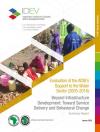In 2016, Independent Development Evaluation at the African Development Bank embarked on a rigorous evaluation of the Bank’s assistance to the water sector in Africa. It targeted Bank interventions in Water Supply and Sanitation (WSS), in both rural and urban contexts, and Agricultural Water Management (AWM) from 2005 to 2016, focusing on the assistance the Bank provided in the form of infrastructure, knowledge and analytical work. The evaluation was in response to a request by the Bank’s Board of Directors for information on the results of the Bank’s support for WSS (UA 3.7 billion) and AWM (UA 2.2 billion) during the evaluation period. It aimed to inform the Bank’s strategies and operational approach to water sector assistance by taking stock of the results of the Bank’s assistance and drawing lessons for future work.
A reconstructed Theory of Change approach was used, combined with the standard evaluation criteria (relevance, effectiveness, efficiency and sustainability). The evaluation obtained data from multiple sources of evidence including: (i) a document, policy and literature review; (ii) a review of the Bank’s water portfolio; (iii) 41 Project Evaluation Reports comprising 16 rural WSS, 15 urban WSS and 9 AWM projects, and a Water Sector Adjustment program across 23 countries; and (iv) 10 country case studies. Additional data was drawn from interviews with about 200 individuals as well as stakeholder meetings conducted during project site visits. A software for analysis of qualitative data and matrix tables were used in synthesizing the evidence.
The Bank’s water sector interventions were found to be relevant, and they delivered substantial outputs, although output levels remained below expectations. Achievement of outcomes was found to be moderate (particularly in the area of sanitation), leading to overall effectiveness being rated as unsatisfactory. Efficiency was likewise found unsatisfactory, and the results achieved are unlikely to be sustained. Based on the results achieved, how the Bank managed performance and the factors that influence that performance, the following recommendations were made to the Bank:
- Continue to enhance its engagement with Regional Member Countries on an integrated approach to water resources development and management, that goes beyond Water Supply and Sanitation and Agricultural Water Management;
- Prioritize sanitation by focusing on the needed policy shifts, introducing new models with sustainable technologies, partnerships, and scale-up mechanisms.
- Deepen ongoing efforts to support increased innovative financing mechanisms (including private sector participation) to accelerate water and sanitation infrastructure development and management in Regional Member Countries.
- Continue to explore innovative ways to strengthen Regional Member Countries’ institutional capacity and the performance of service providers toward sustained service delivery of water sector interventions to attract funding and foster development impact.
- Continue to adopt appropriate participatory practices through effective collaboration with stakeholders at all stages of the project cycle (identification and design, implementation, completion and exit) for its water sector interventions.
- Improve its measurement and reporting of development results. Specifically, the Monitoring and Evaluation system at project, country, and Bank levels should be strengthened to provide the requisite range of results data (baseline, targets and actual) for design, during implementation, at completion and post-completion. Results data should cover outputs and outcomes (for both hard and soft infrastructure) of its water interventions.
- For improved performance of its Regional Member Countries, continue promotion of platforms, networks and knowledge products to enhance experience and knowledge transfer among development partners, governments, end beneficiaries, sector experts and evaluators.
The sector evaluation is supported by three project cluster evaluations, of Rural Water Supply and Sanitation, Urban Water Supply and Sanitation, and Agricultural Water Management.
Evaluation task manager: Mr. Joseph Mouanda


